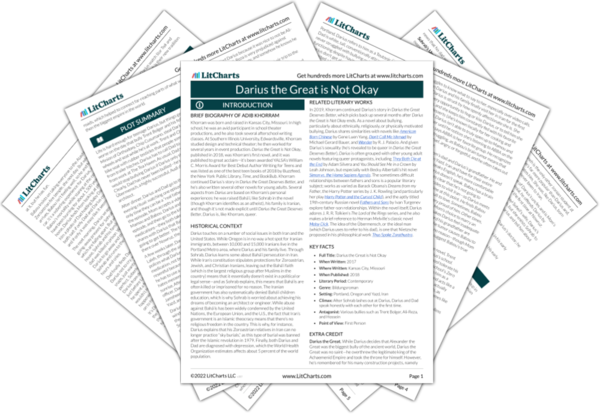At home in Portland, Darius is Trent Bolger’s favorite bullying target. Darius is nerdy, overweight, half Persian, and has a name that starts with D, which lends itself to all manner of cruel nicknames (like “D-Bag”). Initially, Dad and, to some degree, Darius himself blame Darius for the bullying he experiences: Dad insists that if Darius could just act a little more “normal” and stand up for himself, bullies wouldn’t pick on him, while Darius maintains that he’s destined to be a target thanks to his half-Persian identity and his name. This outlook makes Darius feel powerless and even worse about himself, as no matter what Dad says, Darius knows he can’t singlehandedly stop Trent from bullying him. But as the novel progresses, Darius and his friends and family—even Dad—come to a new understanding about bullying: that it’s never about the person being targeted, and it has everything to do with the bully himself.
Darius first begins to understand this when he meets Sohrab in Yazd and they play soccer for the first time. While Sohrab seems nice at first, he joins his friends in teasing Darius for being uncircumcised. Later, though, when he apologizes, Sohrab reveals that he only joined in on the bullying because it was nice, for once, to not be the target himself. In other words, Sohrab chose to bully Darius because of his own insecurities, not because there’s anything wrong with Darius. Darius eventually discovers that Dad’s misguided attempts to blame Darius for Trent’s bullying is also about Dad’s fears and insecurities, not proof that Darius is actually disappointing: Dad is trying in the only way he knows how to protect Darius, though his methods are harmful rather than helpful. And while readers never get any insight into Trent’s psyche or motivations for bullying, Darius does recognize that Trent has no idea what he’s talking about when he calls Darius a “terrorist” or teases Darius about encountering camels and cacti in Iran—his ignorance, selfishness, and need to make himself feel better by putting others down leads to his cruelty. While the novel acknowledges that knowing this about bullies doesn’t always make bullying less painful, it nevertheless helps Darius feel more secure in who he is—to believe, for the first time in his life, that he’s fine just the way he is and doesn’t need to change himself to please people who are impossible to please.
Bullying ThemeTracker

Bullying Quotes in Darius the Great Is Not Okay
I took my pills and gulped down the whole glass of water. Dad stood next to me, watching, like he was worried I was going to choke. He had this look on his face, the same disappointed look he had when I told him about how Fatty Bolger had replaced my bicycle’s seat with blue truck nuts.
He was ashamed of me.
He was ashamed of us.
Übermensches aren’t supposed to need medication.
“You can’t keep trying to control him,” Mom said. “You have to let him make his own decisions.”
“You know how he gets treated,” Dad said. “You really want that for him?”
“No. But how is making him ashamed of everything going to fix it?”
“I don’t want him to be ashamed,” Dad said. “But he’s got enough going on with his depression, he doesn’t need to be bullied all the time too. He wouldn’t be such a target if he fit in more. If he could just, you know, act a little more normal.”
I thought about that: How back home, all Persians—even Fractional Persians like me and Laleh—were united in our Persian-ness. We celebrated Nowruz and Chaharshanbeh Suri together in big parties, Bahá’ís and Muslims and Jews and Christians and Zoroastrians and even secular humanists like Stephen Kellner, and it didn’t matter. Not really.
Not when we were so few in number.
But here, surrounded by Persians, Sohrab was singled out for being Bahá’í.
He was a target.
And then Sohrab said, “Ayatollah Darioush,” and all three of them laughed.
At me.
I thought I understood Sohrab.
I thought we were going to be friends.
How had I misjudged him so badly?
Maybe Dad was right.
Maybe I would always be a target.
Even for things I couldn’t help. Like being from America. Like having a foreskin.
Those things were normal back home, but not in Iran.
I would never fit in. Not anywhere.
Mamou popped the lid and unsealed the tea. “It looks good, maman. Thank you. You are so sweet. Just like your dad.” She pulled me close and kissed me on both cheeks.
If I had been drinking tea at that moment, I would have imitated Javaneh Esfahani and shot it out of my nose.
No one had ever called Stephen Kellner sweet.
Not ever.
“It was hard for me, you know? Moving to America. When I left here, I was sure I was going to come back. But I didn’t. I fell in love with your dad and stayed, even though I never really felt at home. When you were born I wanted you to grow up American. So you would feel like you belonged.”
I understood that. I really did.
School was hard enough, being a Fractional Persian. I’m not sure I would have survived being Even More Persian.
“I was hurting. And you were there. And I knew how to make you hurt as bad as me.”
He still wouldn’t look at me.
“I’m so ashamed,” he said. “Friends don’t do what I did.”
“Friends forgive,” I said.
“I didn’t mean it, Darioush. What I said. I want you to know.” He finally met my eyes. I’m glad you came. You are my best friend. And I never should have treated you that way.”











